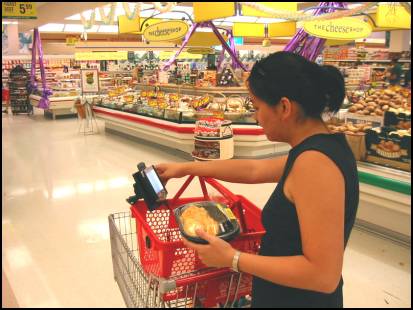
| Project Voyager seeks to
build compelling web services for a ubiquitously networked world, where
people, places, and things have an Internet presence.
An Internet Presence for People, Places and Things Imagine how day-to-day interactions with people, places, and things will change when everything has a connected Internet presence. Cash registers will disappear. Credit cards or paper money becomes obsolete. Paying for groceries becomes a simple exchange of bits on the network: you pick items up, you are sensed as you walk out of the store, and your bank account is autobilled. Paying for cab fare could be as easy as pressing your thumb against a portable computer terminal. Project Voyager examines new notions of people, places, and things online. We seek to link useful web services to people, places, and things--thus building a bridge between the physical and virtual worlds we inhabit. Bringing Web Services Into Your Local Supermarket Our most recent project used wirelessly-networked Pocket PCs to create Personal Shopping Assistants that delivered compelling web services to customers in a supermarket. Our PSA system illustrates how to associate "virtual" services, such as personalized discounts, a recipe finder, a product recommendation agent, and mobile point of sales with products in a store.
A shopper testing out a wireless, Pocket
PC based Personal Shopping Assistant at a Working with the Royal Ahold - the parent company of the Stop & Shop supermarket chain, Kraft, Microsoft, Symbol Technologies, and Motorola, we built a Personal Shopping Assistant (PSA) that integrated various web services in order to offer customers a new shopping experience. Shoppers received a customized Pocket PC as they entered the store. The Pocket PC provided shoppers with access to services such as mobile point of sale and self-checkout, a personalized recipe recommendation service, personalized discounts, and context-dependent product suggestions. The PSA system is built upon an infrastructure where every product in the store has an "Internet presence." Thus, consumers, through the PSA, were able to access useful and valuable data such as recipes, discounts, and nutrition information that is otherwise difficult to obtain while inside the store. As such, Project Voyager enabled Media Laboratory to evaluate the PSA's impact on consumers, as well as to provide a very public demonstration as to how a web-based platform can be used to aggregate different backend services to build a useful consumer-based shopping application. Copyright (c) 2000-2001 MIT Media Laboratory. All Rights Reserved. E-Mail: voyager@media.mit.edu. |
